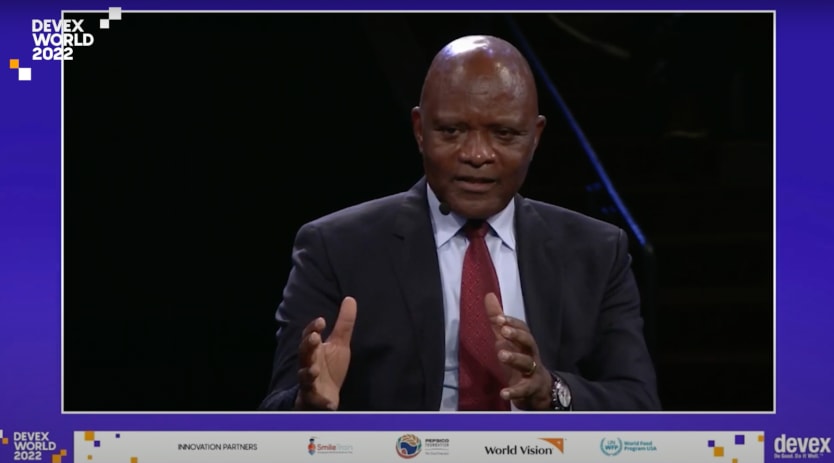
In the middle of last year, John Nkengasong received an email from the White House asking him if he would consider taking the helm of the U.S. President's Emergency Plan for AIDS Relief, or PEPFAR. At the time, he was the head of the Africa Centres for Disease Control and Prevention, charged with managing the COVID-19 response on the continent.
He initially thought the email was a scam.
It took him about a week to respond. PEPFAR was very far from his mind. After all, African nations were struggling to access COVID-19 vaccines, and new waves of cases were overwhelming hospitals.
“I wasn't thinking of PEPFAR, rightly so,” he told audience members at Devex World in Washington on Tuesday.
But Nkengasong, who has decades of experience in fighting HIV/AIDS, said he also “knew the war against HIV/AIDS was still on.”
"I had to make a judgment call. And at that point, I said: How do you leave a continent that was in the middle of a pandemic to jump ship?"
So he mulled it over. He thought that the continent was well-placed to begin rolling out COVID-19 vaccines on a wider scale. He had helped secure 400 million doses of Johnson & Johnson vaccines, and through a partnership with Mastercard Foundation, helped raise $1.5 billion to fund the vaccination campaigns.
He felt at peace with his decision to turn his efforts elsewhere, he said.
Born in Cameroon and a U.S. citizen, Nkengasong said his president, Joe Biden, had called on him for this new role.
He told South African President Cyril Ramaphosa, who was then the chair of the African Union, “If you think I shouldn't go, it is up to you to call the White House and tell them that.”
Nkengasong left Africa CDC to lead PEPFAR about five weeks ago. PEPFAR, which represents the largest commitment made by a country to a single disease, has invested over $110 billion since its inception. It was a homecoming of sorts for Nkengasong, as he was one of the founding leaders of PEPFAR, where he developed the laboratory program that worked to strengthen capacity across Africa.
Celebrating PEPFAR
At Devex World, Nkengasong described PEPFAR as the “best expression of humanity,” with the world coming together on HIV to “solve it collectively.” Over the past two decades, immense progress has been made in the fight, as rates of HIV infection have reduced significantly.
"We should celebrate the journey we've walked,” he said. “20 years ago, it was a desperate situation. It was scary. And that situation has been transformed. PEPFAR has transformed all of that."
“We have to be very deliberate in that we disrupt the systems that are currently in play positively because the world has changed a lot since the current systems were put in place.”
— John Nkengasong, head, PEPFARA key success in PEPFAR’s work, he said, was that health systems strengthening in areas such as laboratories was done to serve overall public health goals, not just focus on this one disease — creating strong platforms that can be leveraged for pandemic preparedness, among other health crises.
But it’s also time to reimagine the fight against HIV, he said, because the battles are getting tougher. In managing pandemics, there are initially low-hanging fruits. But toward the end, containment efforts become harder.
The global health community can manage pandemics, whether COVID-19 or HIV, with the same principles, he said. It’s crucial for health professionals to understand the virus, impacted populations, policies, politics, and partnerships.
Reimagining the global architecture
Asked about Devex’s reporting on the World Health Organization’s efforts to limit the powers of Africa CDC, Nkengasong said it is time to give more power to regional and local public health institutions, while also retaining the unique role of global bodies.
Africa CDC is going through a process to gain more independence, which includes a series of bureaucratic steps within the African Union. Devex obtained a document outlining the stance of WHO Regional Office for Africa on the powers Africa CDC should have. It said that it objects to granting Africa CDC the authority to declare regional health emergencies for the African continent, noting that further discussion is needed, saying it could cause confusion among countries since WHO currently declares health emergencies.
It also said that it objects to Africa CDC coordinating health emergencies, which is also WHO’s, noting that the “potential for duplication of roles needs to be addressed.”
Nkengasong said that it’s time for systems to change. Regions are aspiring to take ownership of their own health security, he said. “We should listen.”
“COVID has taught us that we have to reimagine global architecture,” he said, adding that when structures such as WHO were put in place over 70 years ago, the world’s population was much smaller.
Nkengasong said that regions declaring their own health emergencies is a good idea.
“That will only help the world be a better place. There's nothing wrong in identifying a regional institution to identify an emerging infection, [and] squash it before it becomes a threat globally. That is what we want, isn't it?” he asked.
“We have to be very deliberate in that we disrupt the systems that are currently in play positively because the world has changed a lot since the current systems were put in place,” he added.
The future of a reimagined public health system includes the proliferation of “respectful, action-oriented partnerships,” he said — rather than partnerships that arise when outsiders come with ideas that don’t reflect what countries or communities need or want. “That is disrespect,” he said.
"What I'm preaching is co-creation. So you go to a country and say: ‘Where are your priorities?’" he said.
“Localization, in my view, is making sure that there's an appropriate mixture between what others can do for you and what you can do for yourself,” he said. “It's a win-win for everybody.”









